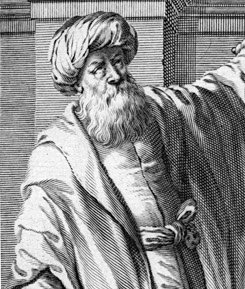The medieval period is often seen as “backwards” today – and to some extent, this really is true. But this era also had some great science, as this audiobook attests. Much of it was in the Western world, but much of it was instead in the Islamic world. This is sometimes considered the “Islamic Golden Age,” with fantastic achievements in the arts and the sciences. For example, the Muslim invention of algebra is a product of this period. Obviously, algebra is more mathematics than science, but it is used extensively in science, and thus is relevant to their discussion at times. This audiobook is careful to avoid the kind of complex mathematics that would repel a general audience, but it judiciously mentions the role of math whenever it is relevant to their discussion.
People often see the early part of the Middle Ages as the “Dark Ages.” Where does this view come from? This is a complex discussion that I will not try to distill here, since I have addressed it elsewhere in two blog posts about the “Dark Ages” (here and here, respectively). Suffice it to say for our present purposes that Greek learning was largely lost after the Roman Empire fell in the fifth century. Thus, humanity largely forgot what it had once known about philosophy, the arts, and (most relevant for our present discussion) the sciences. Such knowledge was preserved in the Muslim world, often in the original Greek language – although there were also many Arabic translations of these works. This is part of the reason that the science of the Muslim world was so advanced, by the standards of the time – their scientists discovered more during this period than did their counterparts in Western Europe.
The Tusi couple, a mathematical device used to model the not-perfectly-circular motions of the planets
Some of these advances were in metallurgy. This is related to alchemy, which is somewhat more speculative. Nonetheless, both disciplines set the stage for later discoveries, many of which were during the later Renaissance period. You can see the Arabic root words in words like “algebra” and “alchemy,” both of which have Arabic’s famous “al.” One might be tempted to dismiss these disciplines as “primitive,” but one should not expect science to be entirely free from error. Indeed, errors and mistakes are a part of the learning process, for both individuals and large communities of researchers. Medieval scientists came up with testable hypotheses, and thus set the stage for the kind of scientific revolutions that followed. This is the standard against which the era’s science should be measured. This is why it can accurately be referred to as “progress.”
The alchemist in search of the philosopher’s stone
One of the things that interested me was how many of the era’s Christian scientists were priests. The Catholic Church is often painted as being “opposed” to science. If we were talking about the later theories of the Sun-centered universe, these critics might have a point. But many of Europe’s finest scientists were priests, whose duties left them time to engage in this kind of research. The church’s role in these things is thus more complicated than it is sometimes supposed to be, and this audiobook helps to show that science and religion often went together at this time. Indeed, that is the way that it has usually been, for Catholics and other God-fearing religious people – and it is only in more recent times that it has been perceived to be otherwise.
Medieval scribe, circa 15th century
As I have shown, Western scholars are not ignored here. Nonetheless, Islamic scholars do make up a great number of the thinkers covered. The narration refers to them by their Arabic names, some of which may be difficult for English speakers to pronounce. They then offer more Anglicized pronunciations that are easier for English speakers to follow. These shortened Anglicized forms allow the narrative to flow better for English speakers, and also allow us to follow their ideas without being distracted by the scientists’ difficult names. They also make mention of Arabic astronomers, who helped humanity to understand the Earth as well. This had an interesting application to their culture. This is that their research allowed them to know which direction to pray in, since Muslims wanted to be able to pray towards Mecca. It was the Arabic astronomers that helped to make it possible for them to do so – something that we can well applaud, whether we are Muslims or Christians or atheists (or anything else, for that matter).
Ibn al-Haytham
Time does not really permit me to do justice to this topic, so suffice it to say that this is a good introduction to the science of the era. It helps to show that there was some real scientific progress during the Middle Ages, even in the part that we today know as the “Dark Ages.”
If you liked this post, you might also like:
Part of an audiobook series
Science & Discovery
Medieval Science
See also the audiobook series
The Giants of Philosophy
Others to be covered later








No comments:
Post a Comment